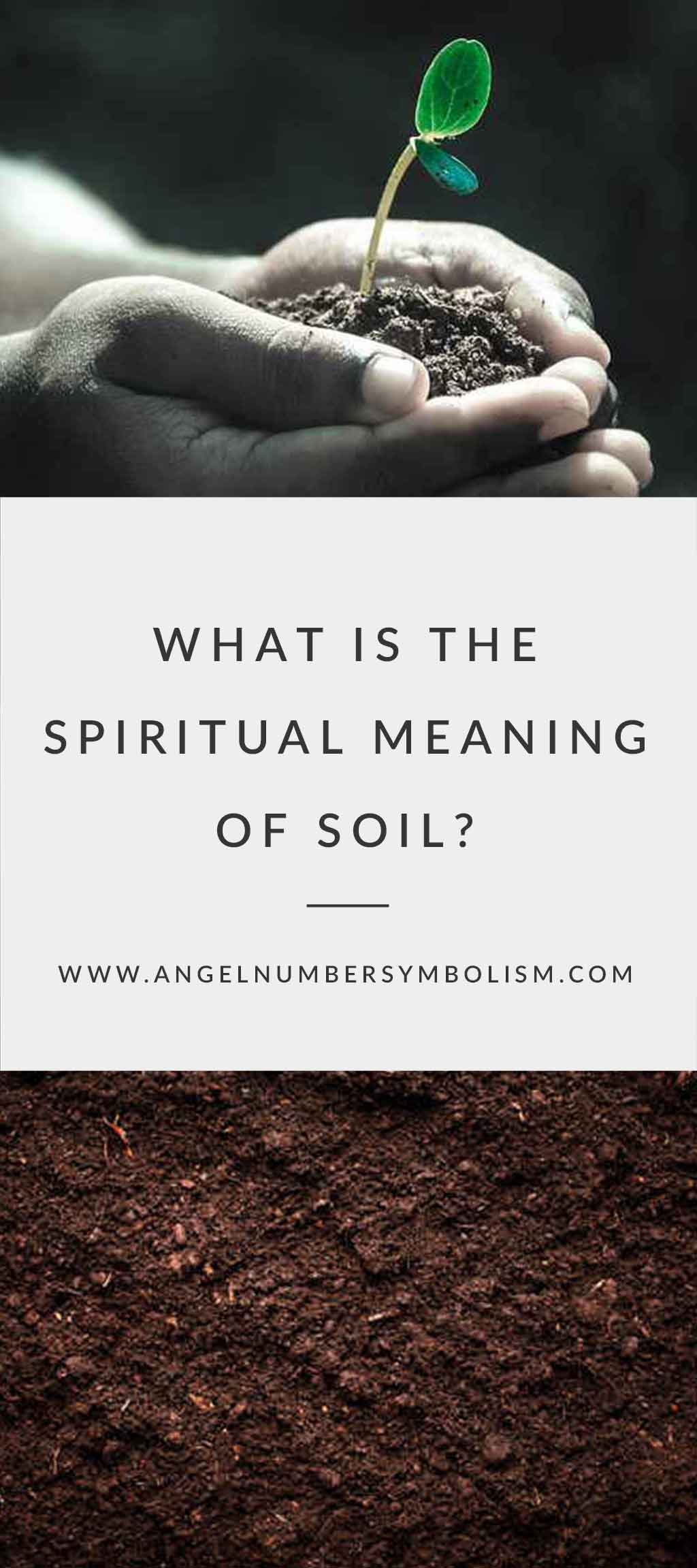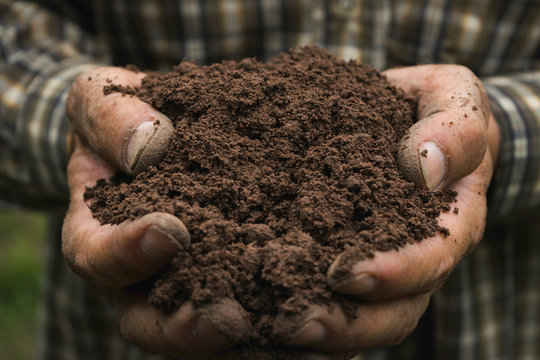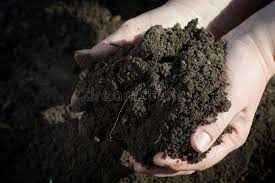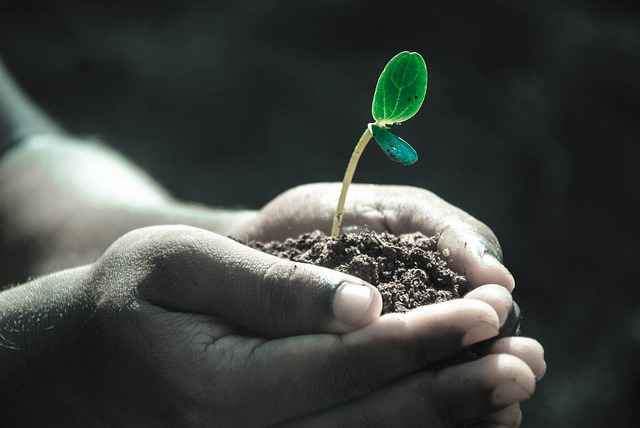Growing up, we often learned about soil in a scientific context – as the foundation for plants to grow and the provider of nutrients.
But beyond its physical properties, soil holds a deeper significance that transcends science and taps into the realm of spirituality. The spiritual meaning of soil is a profound concept that reveals the sacred connection between humans and the Earth.
Exploring the spiritual significance of soil unravels a tapestry of symbolism, cultural reverence, and personal transformation. It invites us to connect with the divine energy of the Earth, find nourishment and grounding, and embark on a journey of spiritual growth.
Whether we encounter soil in religious texts, dreams, literature, or rituals, it serves as a powerful metaphor and conduit for our spiritual transformation.
In this article, we will delve into the spiritual meaning of soil and its various facets. We will uncover its symbolism in spirituality, its significance in different religious contexts, and its role as a metaphor for spiritual growth and nourishment.
We will explore the profound connection between Black people and the soil, examining the ancestral ties and cultural symbolism that have been maintained despite a painful history.

Additionally, we will delve into soil’s presence in dreams, literature, and mythology, uncovering the wisdom it imparts and the lessons it teaches.
The spiritual implications of soil extend beyond personal transformation to encompass healing, connection, and stewardship.
We will explore how connecting with soil’s energy can provide spiritual healing, balance, and solace. By recognizing the environmental aspect of soil, we can embrace our spiritual duty to protect and preserve the Earth’s resources for future generations.
Join us on this journey as we unearth the sacred connection between humans and soil, and discover the spiritual meaning that lies beneath the surface.
Key Takeaways:
- Soil holds a deeper spiritual significance that goes beyond its physical properties.
- It symbolizes nourishment, grounding, and the divine energy of the Earth.
- The spiritual meaning of soil is present in various religious and cultural contexts.
- Soil serves as a metaphor for personal transformation and spiritual growth.
- Connecting with soil can provide spiritual healing, balance, and connection to the Earth.
The Sacred Relationship between Black People and Soil
For Black people, the relationship with the soil goes beyond its physical properties. It is deeply rooted in ancestral connections and cultural symbolism. Despite the painful history of slavery and sharecropping, Black people have maintained a sacred relationship with the land.
The sacred relationship with soil for Black communities is a testament to their resilience and cultural heritage. Throughout history, soil has played a vital role in sustaining Black livelihoods and preserving cultural traditions. It represents more than just a means of survival; it is a symbol of hope, identity, and empowerment.
In Black culture, soil holds immense symbolism. It is seen as a source of strength, nourishment, and rejuvenation. The act of tilling the land and sowing seeds is perceived as a spiritual connection to ancestors and a way to honor their struggles and resilience.
This sacred bond with the soil serves as a tangible reminder of the deep-rooted ancestral connection that sustains and uplifts Black communities.

However, the relationship between Black people and soil has been marred by the painful legacy of slavery and systemic oppression. The forced labor endured by enslaved Black individuals on plantations created a complex and traumatic association with the land.
Despite this history, many Black individuals and communities have persevered in maintaining their sacred relationship with the soil, finding healing and empowerment in reconnecting with their ancestral roots.
Healing the relationship with soil is an important journey for Black individuals and communities.
By acknowledging the historical significance and collective trauma, steps can be taken towards reconciliation and restoration. This healing process involves reclaiming the narrative and honoring the sacred connection to the land.
Through initiatives such as community gardening, urban farming, and land restoration projects, Black communities are actively rebuilding their relationship with the soil. These efforts not only foster community growth and self-sufficiency, but also serve as a way to preserve cultural traditions and promote environmental sustainability.
By reestablishing a positive and sacred relationship with the soil, Black communities embrace their heritage, strengthen their connection to the land, and find empowerment.
The resilience and reverence for the soil in Black culture continue to inspire and remind us of the transformative power of healing and connection.
Soil as a Metaphor for Spiritual Growth and Nourishment
Soil, with its rich symbolism and profound connection to the Earth, serves as a powerful metaphor for personal transformation and spiritual growth. Just as plants draw nourishment and strength from the soil, we too can cultivate our spiritual roots and find grounding in the embrace of the Earth.
When we think about the qualities of soil, we can find valuable lessons that mirror our own spiritual journeys.
Soil teaches us patience, reminding us that growth takes time and that true transformation often occurs beneath the surface, where roots are nurtured and strengthened. It instills a sense of resilience, as soil endures seasons of change and adversity, yet remains steadfast in its ability to support life.
“Like plants, we can draw spiritual nourishment from the soil, finding sustenance and strength in our connection to the Earth.”
Just as plants need nourishment to thrive, so do our spirits. The soil provides us with the spiritual nourishment we need to flourish. By establishing a deep connection with the Earth, we can access the grounding energy it offers, allowing us to find stability and balance amidst the chaos of everyday life.
Cultivating our spiritual roots and finding grounding in soil involves embracing the cycles of growth and decay that exist within us and in the natural world.
It requires us to recognize the interconnectedness of all living beings and to honor our role as caretakers of the Earth.
Lessons from Soil for Spiritual Growth:
- Patience in the face of growth and transformation.
- Resilience, enduring and adapting to change.
- Connection to the Earth for spiritual nourishment.
- Finding grounding and stability in the embrace of soil.
- Honoring our role as caretakers of the Earth.
As we delve deeper into the metaphorical richness of soil, we begin to uncover the transformative power it holds. By embracing the teachings of the soil and its nurturing qualities, we can foster spiritual growth, find nourishment for our souls, and cultivate a profound connection to the Earth.
In doing so, we embark on a journey of personal transformation that leads us to a more grounded and vibrant existence.
The Divine Nature of Soil in Religious Symbolism
Soil holds significant symbolism in various religious traditions. It is seen as a divine element, representing the foundation of life and the connection to the divine.
In Christianity, soil takes on symbolic meaning through the concept of “ashes to ashes, dust to dust.” This phrase emphasizes the idea that humans are created from the earth and will return to it after death, showcasing soil’s role in the cycle of life and its divine connection.
Hinduism also assigns spiritual significance to soil, particularly clay. Clay is used in religious rituals, such as creating sacred idols or images of deities, representing the divine presence. The malleability of clay symbolizes the pliability of human beings, reminding followers of their connection to the divine through the earth.
“From dust we come, and to dust we shall return.”
In Native American cultures, soil is revered as a source of sustenance and embodies the sacredness of the land. It symbolizes the interconnectedness of all living beings and the harmony between humans and nature.
Various religious rituals involve soil as a means of connecting with the divine. For example, burying a deceased loved one in soil during a funeral represents the return of the body to the earth and the belief in an afterlife or spiritual transformation.
The Sacredness of Soil in Different Religions:
- In Christianity: Symbolizes the cycle of life and death, connecting humans to the divine through the earth.
- In Hinduism: Clay represents the divine presence and human connection to the divine through the malleability of clay.
- In Native American cultures: Represents the interconnectedness of all living beings and the harmony between humans and nature.
Understanding the spiritual significance of soil in different religions allows us to appreciate the sacred connection between humanity and the Earth. Through rituals and symbolism involving soil, individuals can deepen their spiritual journeys and honor the divine presence in nature.

The Spiritual Implications of Soil in Dreams
Dreams have long been a source of mystery and fascination, offering insights into our subconscious minds and innermost thoughts. Soil, with its deep-rooted symbolism, often appears in dreams and carries profound spiritual implications.
It serves as a metaphor for various aspects of our lives, representing potential for growth, cleansing and purification, and the need to reconnect with the Earth and seek spiritual grounding.
Soil in dreams can be seen as a fertile ground for personal transformation. Just as soil provides nourishment to plants, it signifies the potential within us to grow and flourish spiritually.
When soil appears in dreams, the interpretations can vary based on the specific context. It could signify the need for a fresh start, a cleansing of past experiences, or the desire for growth and renewal. In these dreams, the soil’s symbolism represents the potential for personal transformation and the fertile ground where new beginnings can take root.
Soil in dreams can also serve as a metaphor for connecting with our roots and finding grounding in our spiritual journey.
In some instances, soil in dreams may convey a message of the importance of grounding ourselves and staying connected to the Earth.
It reminds us to seek stability, balance, and a sense of belonging as we navigate our spiritual paths. Just as roots anchor plants in the soil, our connection to the Earth provides us with a solid foundation for our spiritual growth.
Furthermore, the appearance of soil in dreams may also indicate a need for cleansing and purification. It can symbolize the release of negative emotions, past traumas, or the shedding of old beliefs that no longer serve us. Like the Earth’s ability to absorb and renew, dreaming of soil reminds us of our own capacity for transformation and the opportunity to let go of what no longer serves our spiritual well-being.
Overall, the spiritual interpretations of soil in dreams remind us of the potential within us, the need for grounding, and the cleansing and transformative power of reconnecting with the Earth.
By understanding the symbolism of soil in dreams, we gain valuable insights into our spiritual journey and inner state of being.
It helps us recognize the areas where we can cultivate growth, find stability, and undergo healing and transformation. Dreams involving soil invite us to embrace our connection to the Earth and tap into the spiritual energy it provides.
Symbolic Interpretations of Soil in Dreams
| Dream Symbol | Interpretation |
|---|---|
| Rich and fertile soil | Signifies potential for growth and abundance in all areas of life |
| Muddy or barren soil | Suggests the need for cleansing and letting go of past negativity |
| Planting seeds in soil | Symbolizes new beginnings and the cultivation of aspirations and goals |
| Working with soil | Indicates the need for grounding, stability, and hands-on connection with nature |
| Dry or cracked soil | Represents a lack of nourishment or emotional emptiness that needs attention |
Interpreting dreams involving soil requires introspection, as the symbolism may differ for each individual. Paying attention to the emotions and events within the dream context can provide further insights into the specific messages being conveyed. By delving into the spiritual interpretations of soil in dreams, we unlock a deeper understanding of ourselves and our spiritual journeys.
Earthly Wisdom in Literature and Mythology
Soil and Earth symbolism have long played a prominent role in literature and mythology, serving as powerful metaphors for human experiences. These cultural narratives provide deep insights into the spiritual significance of soil and its portrayal in storytelling.
In biblical references, soil is often depicted as the foundation of existence, representing the cycles of life and grounding. This symbolism can be seen in passages like the Parable of the Sower, where different soils symbolize the receptivity of individuals to spiritual teachings.
Native American mythology also portrays soil as a profound symbol of connection to the Earth and the cycles of nature. In many creation stories, soil is the substance from which humanity emerges, highlighting its role as the starting point of life.
“From dust you were created, and to dust you shall return.” – Genesis 3:19
The symbolism of soil extends beyond religious texts and folklore to encompass a wide range of literature. Soil is often used as a metaphor for human experiences, representing growth, nourishment, and the potential for transformation.
In works like Steinbeck’s “The Grapes of Wrath,” soil embodies both the struggles and resilience of the characters, as they battle for survival during the Great Depression.
The fertility of the soil becomes a symbol of hope and a source of sustenance in their arduous journey.
Furthermore, soil’s symbolism as a metaphor for human experiences is evident in the poetry of Langston Hughes. In his poem “Mother to Son,” he uses the metaphor of a crystal staircase representing life’s challenges and compares it to a staircase built with tacks, splinters, and torn-up boards.
This metaphor underscores the hardships experienced by the protagonist, similar to the struggles plants face in harsh soil conditions.
The Symbolism of Soil in Storytelling
The depiction of soil in literature and mythology serves as a powerful metaphor for various aspects of the human experience.
It represents the foundation upon which our lives are built, the challenges we face, and the potential for growth and transformation. The symbolism of soil connects us to the Earth and reminds us of our interconnectedness with nature.
Through the portrayal of soil in storytelling, we are invited to reflect on our own journeys, recognizing the importance of grounding, nourishment, and resilience. Just as plants derive sustenance from the soil, we can draw wisdom from these narratives to navigate the complexities of life.
The symbolism of soil in literature and mythology provides a rich tapestry of understanding, inviting us to delve deeper into the spiritual significance of our earthly existence. By exploring these cultural narratives, we broaden our perspective and gain insights that can guide us on our own spiritual journeys.
| Soil Symbolism in Literature and Mythology | Key Themes |
|---|---|
| Biblical References | Foundation of life, grounding, cycles of life |
| Native American Mythology | Connection to the Earth, starting point of life |
| Steinbeck’s “The Grapes of Wrath” | Struggles, resilience, hope |
| Langston Hughes’ Poetry | Life’s challenges, growth, resilience |
Soil as a Source of Spiritual Healing and Connection
Soil is more than just the foundation upon which we walk. It holds a profound power for spiritual healing and connection.
By connecting with the energy of the Earth, we can find solace, balance, and deep spiritual healing. In this section, we explore various practices that allow us to tap into the spiritual energy of soil, enhancing our spiritual journeys and nurturing our souls.
Dirt Meditation: Communing with the Earth’s Energy
One powerful way to connect with the spiritual energy of soil is through dirt meditation. Find a quiet spot outdoors, preferably in nature or a garden, where you can sit comfortably on the ground. Close your eyes, take deep breaths, and consciously focus on the sensation of the soil beneath you.
Visualize yourself being rooted and grounded, drawing in the Earth’s energy and allowing it to cleanse and heal you from within. Let the soil’s energy flow through you, bringing you a sense of calm, grounding, and spiritual connection.
Soil Therapy: Embracing the Earth’s Nurturing Embrace
Similar to the concept of forest bathing, soil therapy involves immersing oneself in the healing power of the Earth. Find a peaceful, natural setting where you can interact with the soil directly.
Take off your shoes and socks and walk barefoot on the ground, allowing your feet to sink into the soil. Feel the texture, temperature, and energy of the Earth beneath you.
Engage your senses by touching the soil, smelling its earthy aroma, and even tasting it if you feel inclined (ensuring it is safe to do so). Allow yourself to be embraced by the Earth’s nurturing presence, absorbing its healing energy and feeling a deep sense of connection to the natural world.
Grounding Exercises: Reconnecting with the Earth’s Wisdom
Grounding exercises involve deliberately and consciously connecting with the Earth’s energy to restore balance and find spiritual grounding. There are several techniques you can try, such as:
- Lying on the ground with your body stretched out and allowing the Earth’s energy to flow through you.
- Sitting cross-legged on the soil and visualizing roots growing from your body into the Earth, anchoring you in its energy.
- Hugging a tree or sitting with your back against it, feeling its connection to the Earth and absorbing its grounding energy.
By engaging in these grounding exercises, you can tap into the spiritual energy of soil, reconnect with the wisdom of the Earth, and find comfort, healing, and connection in the process.

The Environmental and Stewardship Aspect of Soil
Recognizing the spiritual significance of soil goes beyond its symbolic value; it also extends to our environmental responsibilities and stewardship of the Earth.
We believe that soil conservation and sustainable living practices are not just practical necessities but also spiritual imperatives.
Soil serves as a vital natural resource that sustains life on our planet. It nourishes plants, supports ecosystems, stores water, and plays a critical role in carbon sequestration.
By acknowledging the spiritual connection we have with the soil, we are compelled to act as custodians of this precious resource for present and future generations.
The Importance of Soil Conservation
Soil conservation is an essential practice that aims to prevent soil degradation and loss. It involves adopting strategies that preserve the quality and fertility of the soil, such as minimizing erosion, enhancing soil structure, and promoting organic matter content.
When we engage in soil conservation, we honor our spiritual duty towards the Earth. By taking concrete steps to protect and maintain healthy soil ecosystems, we contribute to the overall well-being of the planet and ensure the availability of fertile soil for sustainable food production.
Harvesting Sustainable Living Practices
Sustainable living is a way of life that harmonizes with nature and promotes the responsible use of Earth’s resources. By embracing sustainable practices, we reduce our ecological footprint and minimize negative impacts on the soil and the environment.
Some sustainable living practices that contribute to soil protection include:
- Composting organic waste to enrich soil fertility
- Implementing crop rotation and cover cropping to improve soil health
- Using organic and natural fertilizers instead of synthetic chemicals
- Practicing water conservation to prevent soil erosion
- Supporting regenerative agriculture methods that restore soil health
By adopting sustainable living practices, we demonstrate our reverence for the Earth and our commitment to nurturing the soil that sustains us.
The Impact of Soil Degradation
“The sequel follows a cycle of deteriorating soil quality, leading to reduced agricultural productivity, food insecurity, and compromised ecosystem resilience.”
Soil degradation poses a significant threat to global food security and ecosystem stability. Continuous erosion, nutrient depletion, and contamination can severely impact soil health, making it challenging to grow crops and sustain biodiversity.
Sustaining the Health of Soil Has Far-Reaching Implications:
| Implications of Soil Degradation | Consequences |
|---|---|
| Reduced agricultural productivity | Famine, food scarcity, and economic instability |
| Loss of biodiversity | Diminished ecosystems and increased vulnerability to climate change |
| Increased vulnerability to extreme weather events | Soil erosion, flooding, and landslides |
| Declining water quality | Pollution and compromised availability of clean water |
These consequences reinforce the importance of prioritizing sustainable soil management, adopting agricultural practices that regenerate soil health, and investing in soil conservation initiatives.
Our Spiritual Duty: Nurturing the Soil
As individuals driven by our spiritual connections to the Earth, we have a fundamental duty to protect and nurture the soil. By promoting soil conservation, embracing sustainable living practices, and supporting initiatives that prioritize soil protection, we actively contribute to the well-being of our planet.
The soil not only sustains us physically but also nourishes us spiritually. Through collective action and mindful stewardship, we can ensure that future generations inherit a world where the sacred connection between soil and spirituality remains unbroken.
Conclusion
The spiritual meaning of soil is a profound concept that reminds us of the sacred connection we share with the Earth. By embracing the wisdom of soil, we open ourselves up to a deeper understanding of our spiritual journeys.
Through the nurturing embrace of soil, we find grounding, nourishment, and transformation. It serves as a conduit for spiritual energy, providing us with the stability and support we need to thrive.
By honoring the importance of spiritual grounding and recognizing the divine nature of soil, we cultivate a more harmonious relationship with the Earth. This connection not only benefits our own growth but also contributes to the overall well-being of our planet.
FAQ
What is the spiritual meaning of soil?
The spiritual meaning of soil goes beyond its physical properties and is deeply connected to growth, grounding, and the divine energy of the Earth. It represents a sacred connection to the Earth and our spiritual journeys.
What is the significance of soil in Black culture?
For Black people, the relationship with soil is deeply rooted in ancestral connections and cultural symbolism. Despite the painful history of slavery and sharecropping, Black communities have maintained a sacred relationship with the land.
How does soil symbolize spiritual growth?
Soil is often used as a metaphor for spiritual growth and nourishment. Just as plants grow and thrive in fertile soil, individuals can cultivate their spiritual growth by connecting with the Earth and cultivating their spiritual roots.
How is soil represented in religious symbolism?
In various religious traditions, soil is seen as a divine element that represents the foundation of life and our connection to the divine. It is used in religious rituals and holds deep symbolism in different faiths.
What is the spiritual meaning of soil in dreams?
Soil in dreams can symbolize potential for growth, cleansing and purification, or the need to reconnect with the Earth and seek spiritual grounding. Its spiritual interpretation can provide insights into one’s spiritual journey and inner state of being.
How is soil depicted in literature and mythology?
Soil holds rich metaphors in literature and mythology, representing the cycles of life, grounding, and the foundation of existence. It is often used to convey deeper meanings and life lessons in cultural narratives.
How can soil be a source of spiritual healing and connection?
Connecting with the energy of the Earth and engaging in practices like dirt meditation and grounding exercises can help individuals find spiritual healing, balance, and connection. Soil is believed to hold grounding qualities and can enhance one’s spiritual journey.
What is the environmental and stewardship aspect of soil?
Recognizing the spiritual significance of soil extends to environmental and stewardship aspects. Soil conservation and sustainable living practices are seen as a spiritual duty to protect and preserve the Earth’s resources and contribute to a harmonious relationship with the land.
How can embracing the spiritual meaning of soil enhance our lives?
Embracing the spiritual meaning of soil allows us to deepen our connection to the Earth, find grounding and nourishment, and facilitate our spiritual growth and transformation. It also contributes to a more sustainable and interconnected world.




